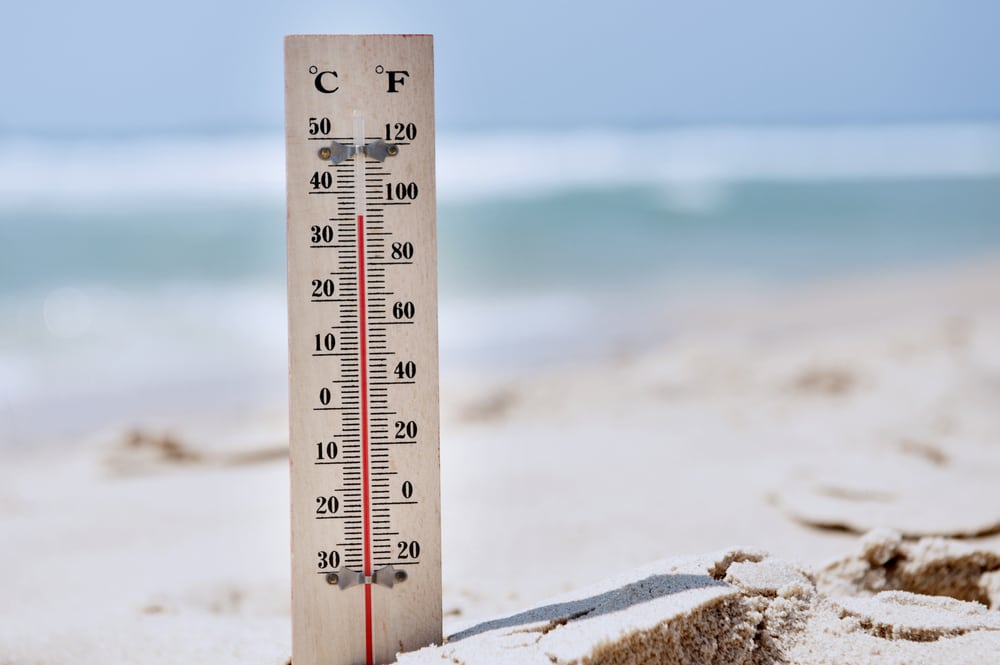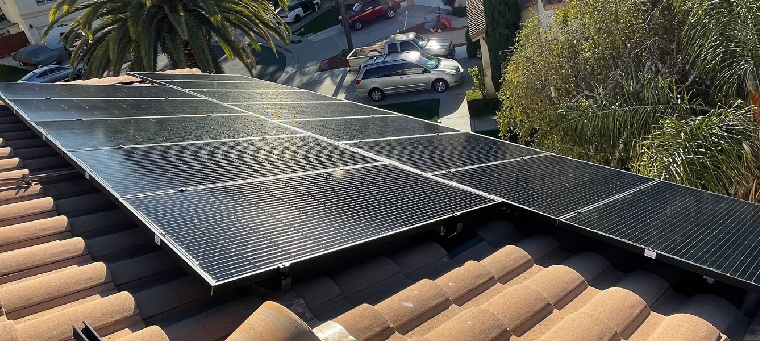Summer is making its way to California, and unless you are fortunate enough to live on the cooler coastline, temperatures are going to start to sizzle. How does all this heat affect the solar panels on your home? Many homeowners assume solar panels do well in heat. After all, sunlight and heat go hand-in-hand. The more sunlight, the energy solar panels produce, right?
The truth is that excessive heat can actually make solar panels less efficient. What does that mean if you happen to live in Sacramento where summer temps top 90 degrees (Fahrenheit) or Fresno, which is no stranger to triple-digit highs? Let’s take a look at how heat affects solar panels for your house and how you can use this knowledge to get the best solar panel system for your piece of California paradise.
Heat and Solar Panels
To understand why high temperatures zap solar panel efficiency like a form of solar panel Kryptonite, we first have to discuss how solar panels work. In a nutshell, solar panels take advantage of all the light energy the sun sends down to earth in the form of photons. These little photons knock electrons out of the atoms that make up a solar panel cell. These dislodged electrons then zip around a circuit within the solar panel. It is this movement that produces an electric current.
One factor that plays a role in how much power each little zipping electron creates is its original state before it gets knocked out of its electron. On a cool day, electrons exist in a nice, relaxed resting state. When the photon kicks them out of the atom, they become more energized. This difference, from low energy to high energy, produces a high current.
On a hot day, the situation is different. The heat within the panels already puts the electrons into an excited state. That means they won’t pick up much energy when they are dislodged by the photons. So even though a solar panel can get the same amount of sunlight on a cool day and a hot day, the panels will produce more energy on the cool day. Depending on your brand of solar panel and the actual temperature on your roof, high heat can steal away as much as 10% of your solar system’s efficiency.
How Hot Is Too Hot?

How much heat can the solar panels on your home really handle? That depends on the solar panel brand you choose and something called its temperature coefficient. When you’re shopping for solar panels, you’ll notice that each different brand has an efficiency rating, with an average efficiency of 15%. A solar panel’s efficiency rate refers to how much sunlight it can convert into usable energy. Each solar panel brand will also have a temperature coefficient, which explains how well the panels perform in high temperatures.
Generally, solar panels don’t begin to lose efficiency until their temperature rises to 77 degrees. At that point, for every degree increase in temperature above 77 degrees, a solar panel loses efficiency by the rate of its temperature coefficient.
You can start to see how hot summer days can diminish the performance of your solar panels. This can be problematic at a time when you’ll probably want to keep that air conditioning going strong. Fortunately, good solar installers can offer different solutions to help your solar system manage hot days.
How to Beat the Heat
If you live in a part of California that endures long, hot summers, is there a way to beat the heat to ensure that solar panels for your house are still a good investment?
Choose the Right Solar Panels
The first way to manage the heat is to choose solar panels with a low temperature coefficient. Most monocrystalline and polycrystalline photovoltaic (PV) panels offer a temperature coefficient between -0.35 and -0.5.
You may have heard of a different kind of solar panel called a thin-film panel (TF). One of the biggest benefits these panels offer is that they can handle heat much better than their PV counterparts. Most TF panels offer a temperature coefficient of between -0.2 and -0.25. There’s a catch, though. TF panels have a much lower efficiency rate than PV panels, usually between 11-13% efficiency. Unless you live in some of the hottest areas of California, TF panels generally don’t match PV efficiency in the long run even with their lower temperature coefficients.
Choose the Right Solar System Size
When you work with Semper Solaris, we’ll calculate your average monthly energy usage in order to determine the ideal size for your solar system; we also know to check average summer temperatures and to keep the temperature coefficient in mind when making our recommendations.
This is just one more reason why you should strongly consider working with a local solar panel installation company. A local company will already be familiar with the weather patterns of your area and will understand how the summer months will affect the efficiency of your solar system.
If you endure long and hot summer months, your installation specialist may recommend a slightly larger solar system to make up for the efficiency loss during days with high temperatures.
High Quality Installation
While there really is no way to prevent diminished solar panel efficiency during the hottest days of the summer, your solar installation company can install your panels in a way to keep them as cool as possible to limit efficiency loss. For example, it’s common for installers to house panels in a thermally conductive substrate, which helps vent away heat.
During hot days, many types of California roofing, including Spanish tiles and asphalt shingles, will absorb heat, just like a concrete sidewalk, which can make temperatures on your roof even higher than the ambient temperature. To address this, your installer will likely mount your panels a few inches above the roof. This allows for airflow between the panels and the roof and can help prevent a hot roof from heating up your solar panels.
Choose the Right Solar Installer
Even if your part of the state gets some serious heat in the summer, that doesn’t mean you have to give up on solar panels for your home. Instead, work with an experienced and local solar installer who can recommend the ideal solar system for your geographic area. Even if your solar panels aren’t as efficient during the summer, just remember that California’s weather is typically gorgeous (i.e. not sweltering) for a majority of the year, which means that your solar system can make up for diminished summer returns during the rest of the year.
This is especially true because California offers net metering, which allows you to take energy from the grid when you need more power than your panels can produce and to put excess energy back into the grid when your panels generate too much in exchange for an energy credit. A well-designed solar panel system will average out during the year, reducing or even eliminating your energy bills altogether!
Interested in solar panels but want to know how the summer temps in your area will affect your system? Contact us to schedule a free energy analysis. We would be happy to send a solar specialist to your home from one of our locations throughout California.
